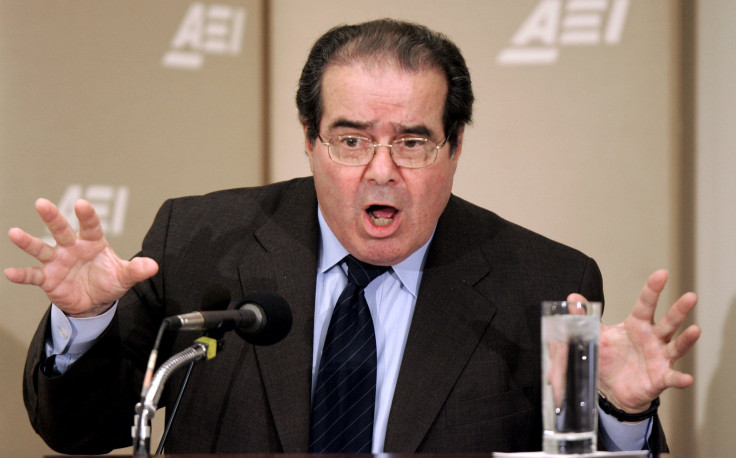Antonin Scalia’s Best Quotes: 5 Sayings From The Conservative Supreme Court Justice Who Died Last Year

The Supreme Court's loss one of its more conservative justices on Feb. 13, 2016 offset the ideological balance somewhat in favor of the more liberal judges. Antonin Scalia's death also left the remaining judges to defer to lower court decisions on the four occasions it reached a 4-4 split ruling. But America’s highest court also lost an opinion writer with a rather memorable vocabulary and known for his rhetorical quirks.
Below are some of Scalia’s most colorful writings, straight from the Supreme Court dockets.
'What is Golf'
The 2001 decision PGA Tour Inc. v. Martin ruled 7-2 that a golfer with a circulatory problem had the right to use a golf cart to traverse the grounds of the PGA Tour, which had previously required all golfers to walk between shots. Scalia’s dissent sought to give the court broad authority over the rules of the game. He also gave his colleagues a brief history lesson.
"It has been rendered the solemn duty of the Supreme Court of the United States, laid upon it by Congress in pursuance of the Federal Government’s power ‘[t]o regulate Commerce with foreign Nations, and among the several States,’ to decide What Is Golf,” he wrote in a dissent, joined by Justice Clarence Thomas. “I am sure that the Framers of the Constitution, aware of the 1457 edict of King James II of Scotland prohibiting golf because it interfered with the practice of archery, fully expected that sooner or later the paths of golf and government… would once again cross, and that the judges of this august Court would some day [sic] have to wrestle with that age-old jurisprudential question, for which their years of study in the law have so well prepared them: Is someone riding around a golf course from shot to shot really a golfer? The answer, we learn, is yes. The Court ultimately concludes, and it will henceforth be the Law of the Land, that walking is not a ‘fundamental’ aspect of golf."
'You can make people buy broccoli'
Verbally protesting the Affordable Care Act’s requirement that all Americans have health insurance, Scalia pondered whether the administration couldn’t use its health care logic to force all citizens to buy vegetables.
“Could you define the market—everybody has to buy food sooner or later, so you define the market as food,” he said. “Therefore, everybody is in the market. Therefore, you can make people buy broccoli.”
This philosophical proposition gained traction among his colleagues. The broccoli metaphor appeared in the final ruling on the ACA no less than a dozen times, recycled by Justice Ruth Bader Ginsburg and Chief Justice John Roberts. The vegetable went on to become a symbol of the debate over the ACA.
'Jiggery-pokery'
In the 2015 case King v. Burwell, which upheld the Affordable Care Act's establishment of tax credits for people enrolled in health insurance plans on both state and federal exchanges, Scalia lambasted “interpretive jiggery-pokery” in the court's analysis of the ACA’s language. The law’s provisions, he wrote in a dissent, joined by Justices Thomas and Samuel Alito, were “perfectly consistent with limiting tax credits to state exchanges” and denied the tax credits to those on federal exchanges.
'Pure applesauce'
Two pages later in the 21-page dissent, Scalia alluded to another healthy snack when expressing his disapproval of the majority opinion.
The applicability of tax credits to people enrolled on both state and federal exchanges, when the law “defines a qualified individual as someone who… lives in the ‘state that established the exchange,’” would leave out the federal exchange enrollees, making the provision “pure applesauce,” he wrote. He went on to describe the law’s language as similar to a university requirement all professors to hold office hours for graduate students, even professors who teach only undergrads.
'The mystical aphorisms of the fortune cookie'
Scalia once again resorted to food metaphors in his dissent in Obergefell v. Hodges. In the 5-4 decision that guaranteed same-sex couples’ nationwide right to legally marry in June 2015, Scalia bashed the language of the majority opinion as something he might find on a slip of paper tucked inside the dessert traditionally enjoyed at Chinese restaurants.
“If, even as the price to be paid for a fifth vote, I ever joined an opinion for the court that began: ‘The Constitution promises liberty to all within its reach, a liberty that includes certain specific rights that allow persons, within a lawful realm, to define and express their identity,’ I would hide my head in a bag,” he wrote. “The Supreme Court of the United States has descended from the disciplined legal reasoning of John Marshall and Joseph Story to the mystical aphorisms of the fortune cookie.”
Following his death, mourners formed a haphazard memorial on the Supreme Court steps. Among flower bouquets were fat sprigs of broccoli, jars of applesauce and packaged fortune cookies.
© Copyright IBTimes 2025. All rights reserved.






















